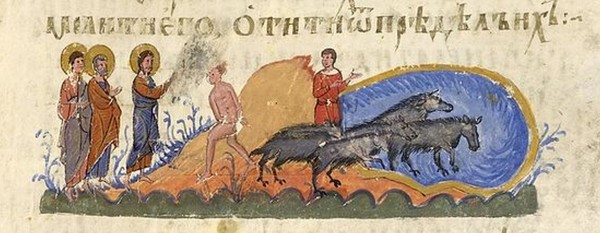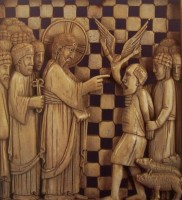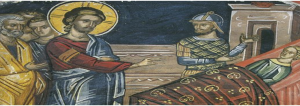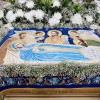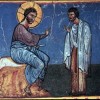A prison inmate, in a series of unfortunate events, had his teeth pulled, his appendix removed, and his right arm amputated after a work mishap.
The warden visited him in the infirmary after the last accident and said, accusingly, “You can’t fool me, Murphy. You are trying to escape piece by piece.”
There are times — I’m sure — when we feel that instead of being one unified self, we are many contradicting, sometimes opposing, pieces of self. Our family pulls one piece of us. Our work pulls another piece of us. Ambition pulls still another piece, etc. We wonder where all this pulling of the pieces of self will get us.
A woman had once seen the picture of how an early Christian martyr was put to death. A horse was tied to each hand and one to each foot, and the horses were all pulling in different directions. She told her psychiatrist that was exactly her condition. She felt she was being “pulled to pieces.”
The Gospel lesson today describes a man who was literally being pulled to pieces. When Jesus asked him, “What is your name?” he replied, “My name is legion.” In the Gospel of Mark 5:9 his answer is, “My name is legion; for we are many.” “Legion” was Latin for an army division of about six thousand soldiers. This man’s personality was so torn to pieces by conflicting interests and drives that he seemed to be not one person, but a whole mob of people all pulling in different directions. The Gospel goes on to define who these many people who dwelt in this person were: “For many demons had entered him,” it says.
Today we do not deny the existence of demons. If anything, we have re-discovered their existence. Even psychiatrists are admitting that there are demons: the demons of hate, revenge, resentment; the demons of greed, guilt, fear; the high-pressure demonology of modern competition, stress, conflict and keeping up with the Joneses. There are people today who are inhabited by many such demons. Their name is “Legion.”
You may recall that Shakespeare made one of his characters say, “To thine own self be true and it must follow as the night the day thou canst not then be false to any man.” This is good as far as it goes. But the question remains to which self shall I be true! The civic self, the parental self, the financial self, the religious self, or the society self? For my name is Legion.
There is the self I think I am. There is the self that others see in me. There is the self I present to the world. Then there is my real self that I hide from all. Our souls are like haunted houses inhabited by saints and devils. As Edward Sanford Martin says,
Within my earthly temple there’s a crowd,
There’s one of us that’s humble, one that’s proud;
There’s one who’s broken-hearted o’er his sins,
There’s one who unrepentant sits and grins;
There’s one who loves his neighbor as himself,
There’s one who cares for naught but fame and self.
From much corroding care I would be free
If once I could determine which is me.
That is my problem. This is every man’s problem. I am not one but many. “I am large,” cried Walt Whitman, “I contain a multitude.” There is the Child, the Parent, and the Adult in me. I am not so much a personality as a battleground, at war with myself, tugged in a thousand different directions. “My name is Legion.”
The word “split” is a key word today. We have split personalities, split families, split nations, split atoms, a split world. We also have splitting headaches. We are in desperate need of a uniting power, of something to keep us from “going to pieces.”
Recently I came across the following statement: “We are trying to live several lives at once, without all our selves being organized by a single mastering life within us.” This is how another modern thinker has expressed it: “Several selves at once! No single mastering life within!” Jesus expressed it this way, “You cannot serve God and mammon.” In other words, we were not made to serve many masters. We were not made to serve God and mammon, God and the crowd, God and Satan without “going to pieces.” We try to mix things that simply won’t mix. Nitroglycerine is an explosive because its constituents (nitric acid, sulphuric acid, and glycerin) naturally do not belong together: a slight blow sends each element hurtling to its proper company. The same happens when we try to pay lip service to Christ and His Church and real service to the world or the crowd. “You cannot serve God and mammon,” said Jesus. God is one. Only one ultimate is needed in life. Any more ultimates would split life into pieces.
Psychology says that in order to develop a mature personality, one must integrate one’s life around a single goal. Jesus expressed it this way, “Seek ye first the kingdom of God…”
Many of our split personalities today issue from split loyalties: partly for Christ, partly for self; partly surrendered to Christ, partly not surrendered to Christ; partly for the kingdom of God, partly not for the kingdom of God. We were not made to find happiness this way. We were made to find happiness and a unified self by integrating our life around the greatest goal in the universe, God in the Person of Christ. He is the “One in Whom all things hang together,” the One in whom we are complete; the only One who can hold life together and keep it from “going to pieces.”
In the first World War the Allies tried the method of having many generals commanding their own armies. It failed. Then they made Foch the supreme commander of all their forces. Only then did they get somewhere. In World War II it was decided early that the invasion of Europe could be carried through successfully if, and only if, one person was placed in supreme command. That position, as we all know, was given to General Eisenhower. Where would the Allied cause be today, if we had been subjected to the frictions, vacillations, hesitations, and indecisions that invariably grow out of multiple or divided control? The confusion would be hopeless.
The principle holds true on the more personal battlefield of your life and mine. We must have one commander-in-chief, one motive over-all, one love, one God, one Ultimate: the Lord Jesus Christ. He becomes the controlling principle, like a traffic policeman who stands on duty at the intersection and controls the flow of traffic. When the traffic policeman abandons his post within us, utter chaos occurs as inner drives and urges are released from control and collide with each other causing confusion and conflict.
When we describe an immoral person as a “loose” person, we don’t realize how accurate this description is. Such a person is not integrated or tightened efficiently within himself. He does things, not because he wants them, but because the crowd is doing them; or like St. Paul he feels a demonic force inside him, pushing him to do things he does not want to do. He is not one but many. His name is Legion. He needs Someone to tighten him up, to fuse him together, to organize and unify his personality. He needs to surrender his life not partly but totally to Christ, to let Christ sit on the throne of his heart, to let Christ be the Organizer, the Presiding Chairman, the Director of life. With Christ’s help we are able to overcome and crucify the many selves that wreak havoc within us: the ambitious self, the angry self, the jealous self, the sinful self.
Whether it is the case of the man dwelling in tombs as in the Gospel lesson, or the man or woman sitting in the pew today, the problem is the same — a divided heart, a divided allegiance, a divided self. There is no way out of this divided condition except through surrender of the self to Christ as Lord.
“Then the people” says the Gospel lesson, “went out to see what had happened, and they came to Jesus, and found the man from whom the demons had gone, sitting at the feet of Jesus, clothed and in his right mind. …” To sit at the feet of Jesus, to learn of Him, to let Him be the organizer of life is to put an end to the strife within the soul, to recover our sanity, to gain a unified command over the empire of our personality so that we might say with St. Paul, “This one thing I do, forgetting those things which are behind, and reaching forth unto those things which are before, I press toward the mark of the high calling of God in Christ Jesus.”













